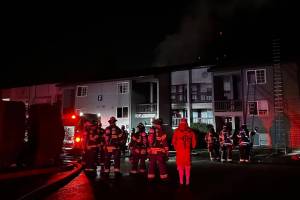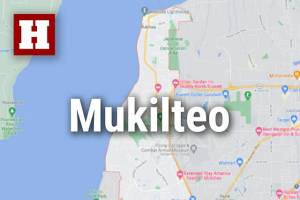After lots of trash talk, budget talk will get real in Olympia
Published 8:07 pm Monday, April 6, 2015
OLYMPIA — It’s nasty time inside the state Capitol, where Democratic and Republican lawmakers are digging in for fierce negotiations on a new two-year budget.
A handful of House and Senate negotiators from both parties will begin meeting this week behind closed doors to try to reach agreement on how much the state will spend and exactly where those dollars will go.
There are fewer than 20 days to reach a deal and avoid a special session of the Legislature, and a deal doesn’t seem probable given the differences in partisan budgets passed by House Democrats and Senate Republicans and the volleys of criticism exchanged by their authors.
Consider these examples:
When House Democrats rolled out their $38.8 billion proposal, the lead budget writer in the Senate blasted its reliance on money from an unpredictable capital gains tax for public schools.
“Quite frankly, I don’t know if that’s unconstitutional or just unconscionable,” said Sen. Andy Hill, R-Redmond, chairman of the Senate Ways and Means Committee.
A few days later, Hill released the Senate Republicans’ $37.8 billion proposal and the author of the House budget said it relied on “overly optimistic” marijuana tax revenues and mystery cuts in spending.
“The Senate’s budget assumes millions in magic agency ‘efficiencies,’ which are essentially budget gimmicks designed to make cuts without being specific about which cuts they’re making,” said Rep. Ross Hunter, D-Medina, chairman of the House Appropriations Committee.
But in Olympia, there’s a rhythm to the ritual, and such rhetoric is the first beat.
Hunter and Hill, who are both well-spoken, detail-oriented former employees of Microsoft, will be steering the talks in pursuit of a compromise before the scheduled end of the session on April 26.
The players
There will be about a dozen people deeply involved. The Democratic and Republican caucus in each chamber will designate two negotiators and have their respective leaders engaged, as well.
Gov. Jay Inslee is scheduled to meet this week with negotiators — individually and collectively — for a frank conversation about his interests. This can be critically important because lawmakers want an idea at the outset what decisions the governor might embrace or oppose. No one wants to waste time on a matter that could get vetoed.
Hunter said he hoped to meet with Hill as early as Wednesday so they can get a handle on the calculations — mathematical and political — that went into their respective plans.
“I can’t really negotiate with them until I understand what they’re doing,” Hunter said.
House Majority Leader Pat Sullivan, D-Covington, and Sen. John Braun, R-Centralia, vice chairman of the Senate budget committee, are the other members of the caucus negotiating teams.
At the outset, there are a slew of big boulders to crack, none larger than how much to spend in the two-year budget, or, in the language of Olympia, “the size of the box.”
The differences
The House plan spends $1 billion more than the Senate’s. It’s likely the final figure will be somewhere in between, which would force Democrats to curb their desires and Republicans to agree to spend more in some areas than they would like.
Another huge boulder is taxes. The Democratic plan seeks to raise $1.5 billion, mostly from a capital gains tax and an increase in the business tax paid by lawyers and other professionals. Senate Republicans insist new or higher taxes are not needed.
Pay hikes for state workers is an obstacle. The House fully funds pay raises negotiated under collective bargaining agreements, while the Senate does not, instead offering an alternative that would cost $66 million less.
There’s also a chasm between the chambers on pay hikes for teachers, expansion of early childhood education, freezing or reducing tuition, and whether to suspend Initiative 1351 or allow voters to modify the measure to lower class sizes.
And on marijuana tax revenue, Democrats would put it into health care while Republicans would put it into public school funding. Unraveling that knot will affect other decisions, lawmakers said.
Even as the negotiators banter on large issues, they and their staffers are going line-by-line through the 500-page tomes in search of agreement on less-costly matters.
For example, the Senate would provide $2.4 million for Washington State University to add classes at the University Center on the campus of Everett Community College. The House would allocate $1.8 million.
And House Democrats want $28.6 million for state parks and $4.6 million for LIDAR mapping of landslide-prone areas, while Senate Republicans would spend $5 million for parks and nothing for the additional mapping.
Reaching a deal
After this week’s initial round of meetings, an unpredictable pace will ensue.
There are no rules for the frequency of conversations or how quickly the two sides might begin exchanging written offers, let alone reach a tentative agreement. In areas where disagreement is deep, lawmakers with expertise in those areas might be summoned to help break an impasse.
When a tentative agreement is reached, it is presented to leaders of the four caucuses, then the members. Each caucus will conduct some version of a vote count, because it is presumed that any deal will pass with some level of bipartisan support.
Even when there’s a deal, much work remains as staff members meticulously ensure the documents possessed by the two sides match to the penny and the bills needed to implement the budget match to the comma.
Through it all, House Speaker Frank Chopp, D-Seattle, and Senate Majority Leader Mark Schoesler will never be far from the negotiations. And as the two chambers close in on a deal, they’ll be in contact, directly or through intermediaries.
If talks stall, the governor will speak with leaders of all four caucuses on how to get around the obstacles.
Lawmakers don’t want to reprise the drama of 2013, when they struggled through two special sessions before reaching a deal hours before a partial shutdown of state government.
“We’re well-positioned to get it done on time,” said Rep. Bruce Chandler, R-Granger, one of the House Republican negotiators. “From my experience, members will take the same vote in July that they would have taken in March. It’s not like making wine. It doesn’t get better with age.”
Getting it right is more important than getting it done by April 26, Hunter said.
Lawmakers are writing a budget and operating documents to guide the state for the next two years, setting a course through the next four years, Hunter said. There is an “existential change” from previous years because it must infuse billions of new dollars into education to comply with a state Supreme Court order for the state to fully fund public schools.
“The whole budget has to be restructured. Getting that right is job one. We’re clearly working hard to get it done in 105 days,” he said. “I think the public should be more focused on what is it that we’re doing than the exact number of days.”
Jerry Cornfield: 360-352-8623; jcornfield@heraldnet.com.




